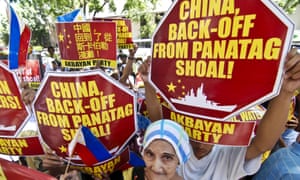Coping With China's Excessive Territoriality
"The risk of conflict in the South China Sea is significant. China, Taiwan, Vietnam, Malaysia, Brunei, and the Philippines have competing territorial and jurisdictional claims, particularly over rights to exploit the region's possibly extensive reserves of oil and gas. Freedom of navigation in the region is also a contentious issue, especially between the United States and China over the right of U.S. military vessels to operate in China's two-hundred-mile exclusive economic zone (EEZ). These tensions are shaping—and being shaped by—rising apprehensions about the growth of China's military power and its regional intentions. China has embarked on a substantial modernization of its maritime paramilitary forces as well as naval capabilities to enforce its sovereignty and jurisdiction claims by force if necessary. At the same time, it is developing capabilities that would put U.S. forces in the region at risk in a conflict, thus potentially denying access to the U.S. Navy in the western Pacific."
Bonnie S. Glaser, Senior Advisor for Asia, Center for Strategic and International Studies

The tension has been building for the last few years between China and its neighbours, China and the United States, in the East and South China Seas, where China invokes the power of a regional and world giant flexing its political muscles to assert its dominance over the region against the interests of its neighbours, even while making incursions and commandeering areas that have traditionally been the purview of other nations in the area.

Immense super tankers and container ships make their way through the South China Sea where $5-trillion in freight passes annually, inclusive of a third of the world's liquid natural gas. The Permanent Court of Arbitration in The Hague is set this month to issue a legally binding ruling. Once its ruling becomes public, Asian nations at loggerheads with China, along with the United States will have to determine what channels they will seek to defend navigation freedom.
China's claim to 85 percent of the South China Sea and those in the East China Sea have spurred it to lay claim to possession being nine-tenths of the law. It has been busy building 'islands' of sizeable dimension on which it has installed airfields denoting military installations for fighter jets, long-range surveillance drones, anti-aircraft and anti-ship missile batteries, made visible by satellite images.
Chinese giant dredgers have constructed new outposts on once-obscure outcroppings claimed by the Philippines and the Vietnamese, Japan and other nations in the region, and have been renamed by China. Leaving Vietnam, Brunei, Malaysia, Japan and South Korea with their overlapping claims, in deep consternation and concern for the future. The Philippines asked the international court for its ruling on shoals and reefs six times closer to Manila than to the Chinese mainland.
China's claims of a "historic right" to ownership of all it identifies as its own has echoes of its occupation of Tibet. The interests of the Communist Party of China are obvious enough; it intends to control navigation, the fisheries and the presumed large oil and gas deposits in those vast watery territories. And just as China has spent enormously to ramp up its military renewal, so too have its neighbours followed suit albeit hardly to the same degree.
Jane's posits that regional military budgets are set to increase from $435-billion in 2015 to $533-billion in 2020. Australia, Vietnam and India will be acquiring new submarines and assault vessels, as has China, along with the use of an old Soviet aircraft carrier on which to train pilots and sailors for the new carrier it is itself building. Submarines armed with nuclear weapons are to be deployed by Beijing in the Pacific Ocean.
This is in response to its allegations of U.S. anti-ballistic missiles being newly deployed in South Korea. Manila has asked of Washington that more visits by the U.S. forces be arranged. In similar vein, several thousand American marines are permanently on standby now in Australia. American, Japanese and Australian worships have joined in naval exercises.
The four billion people who live in that geographic region have ample reason to be slightly on edge.
 |
| Filipinos protest in Manila stage demanding China pull out of the contested Scarborough Shoal in the South China Sea. Photograph: Dondi Tawatao/Getty Images |
Labels: China, Controversy, Japan, Philippines, Territory, United States

<< Home